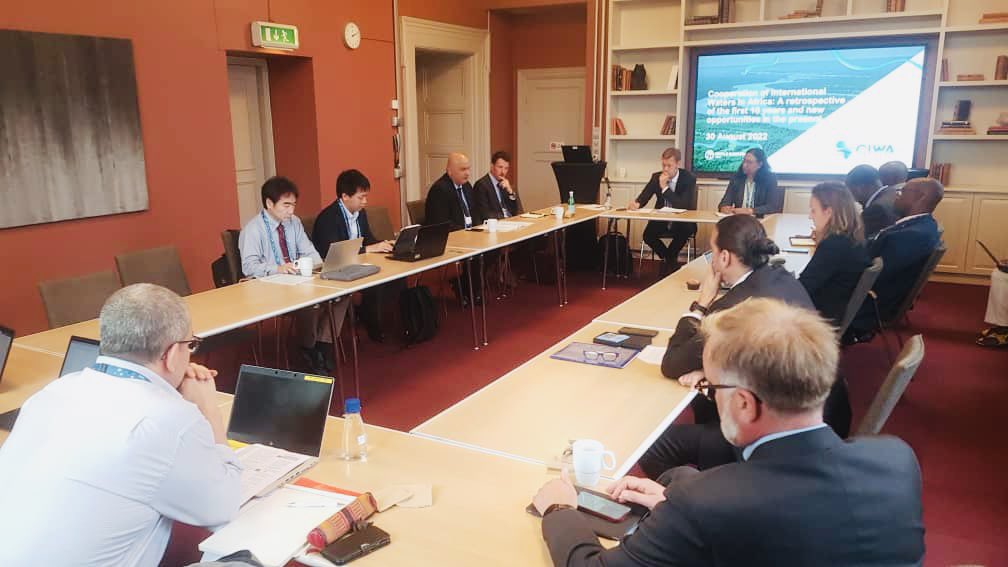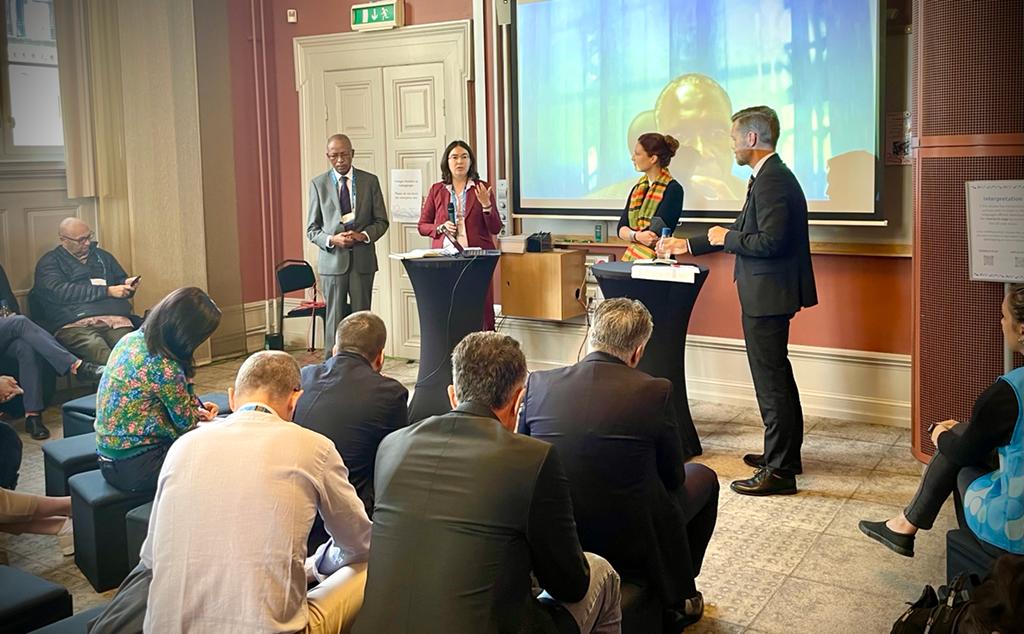SIWI World Water Week 2022: Recap and Highlights from CIWA Program Manager
Posted in : Blog on 16 September 2022
By 2050, Earth could be home to 10 billion people, but we will have no more freshwater than we do today. To avert a global crisis, we must immediately change how we use and manage water. The World Water Week happens each year to further dialogue between a community of change makers who collaborate on and innovate solutions to the world’s greatest water-related challenges.
This year, World Water Week offered close to 300 different sessions and activities and took place 1st in Stockholm (Sweden) from August 23rd to September offering both online and in-person sessions for the first time. This new hybrid format offers many new opportunities to connect a greater cross-section of people and experts from around the world, encourages novel idea generation, innovation, and discussions about our shared future. The theme of this edition of the World Water Week was “Seeing the Unseen: The Value of Water”, with a focus on topics ranging from food security and health to agriculture, technology, biodiversity, and the climate crisis. [Read more on the thematic scope]

One of the CIWA Sessions held during the World Water Week 2022. Photo Credit: Anders Jagerskog
Anders Jagerskog, Program Manager for the CIWA Program and focal lead for transboundary waters issues at the World Bank. He participated in the World Water Week event and shares with us some of his insights..
At the World Water Week in Stockholm the focus was Seeing the Unseen: The Value of Water. Indeed, uncovering the often invisible groundwater upon which so many relies, not least in the African context, permeated the discussions in Stockholm. CIWA, with its partners, took an active part in a number of events and seminars during the week.
A few key messages are emerging from the week; Transboundary water, with a particular focus on groundwater is in (continued) need of attention. With surface basins closing and with climate change vulnerability of countries and regions increasing, there is no choice other than to increase the focus on this topic, both in terms of peace and stability as well as the advancement of economic growth and development opportunities, which are both directly and indirectly linked to transboundary waters.
The increasing emphasis on gender and social inclusion and the importance of giving space to women’s voices within the transboundary context was affirmed by the number of Women in Water Diplomacy Network events. CIWA joined an impressive and diverse collection of 70+ female water diplomats from Africa, Central Asia and North America who collectively called for an increased expression of women’s needs and perspectives at the transboundary water tables. CIWA was given the opportunity to speak to participants about its plans to launch a Male Champions Initiative as well as to highlight the diversity of initiatives it has undertaken thus far to demonstrate its commitment to gender and social inclusion. As the program increases its emphasis on social inclusion including through the launch of a social inclusion tool kit, CIWA also highlighted the importance of accommodating a diversity of voices to ensure the responsiveness of transboundary frameworks and agreements to the needs of everyone including the poorest and most vulnerable.

4 CIWA sessions are available for listening here:
The August 23 Session: Costs of inaction in transboundary water management
The relevance of transboundary water management for climate change adaptation, sustainable development and peace is evident. However, the mobilization of commitments and financial resources for transboundary water cooperation and basin development remains a challenge.
This session provided a platform to debate the different approaches and to exchange ideas as to if and how better capturing the costs of non-cooperation could be a game changer by providing so far untapped incentives to decision makers to engage in cooperation. For example, research institutions, think tanks, the World Bank/ CIWA, UNECE and Basin Organizations.
The August 24 Session: Strengthening Groundwater Governance in SADC: Making the invisible visible
The challenge to secure, adequate and reliable water supply for the SADC region’s developmental needs remains outstanding and requires urgent attention. The CIWA-funded SADC-GMI (Groundwater Management Institute) and international cooperating partners have initiated interventions aimed at strengthening capacity and knowledge around groundwater, with specific focus on institutional and regulatory frameworks as well as the collection and management of groundwater data.
The August 29 Session: Sharing Hidden Treasures: how to improve transboundary groundwater cooperation
The hybrid session focused on the often-invisible resource that transboundary groundwater constitutes. This hidden source of resilience is under threat from lack of cooperation and overuse. The session presented success stories where countries have been able to manage their shared hidden treasures cooperatively and sustainably.
From the Disi Aquifer shared by Jordan and Saudi Arabia to aquifers in West and Eastern Africa, the session will shed light on the role of technology and institutions in managing this precious resource.
The August 30 session: A rising tide: Shared vision for Women in Water Diplomacy
This session built on the results of the Women in Water Diplomacy Network’s Forum, held in advance of World Water Week 2022. The Women in Water Diplomacy Network shared its 2022 Network Statement ‘A Rising Tide’ – a call to action to prioritize gender equality as a lever of positive change across transboundary water management. This statement is endorsed by Network members in the Nile Basin, Central Asia and Afghanistan, together with women water diplomats.
Conclusion
SIWI’s post conference summary spotlighted the 5 important conclusions from World Water Week. Gabriela Suhoschi, Director, World Water Week and Prizes & Torgny Holmgren, Executive Director Stockholm International Water Institute gave their thanks to everyone who has contributed to making this an important, inclusive and impactful conference.
A special thank you to all our CIWA partners who joined and supported us on social media @CIWAprogram during the SIWI Water Week 2022 Event.
Continue to follow us on our Twitter account to stay aware on CIWA’s latest news!
Learn more
In focus
CIWA GESI Framework:
This framework puts forward an overarching strategic approach on gender equality and social inclusion aligned to the concept of transformation that facilitates a harmonized and integrated approach to gender and social inclusion in all of CIWA’s work.
CIWA GESI Learning Notes: 1.Gender Equality and Social Inclusion in Nile Basin Transboundary Water Resources Management and Development
2.Ensuring Gender and Social Inclusion is Considered at the Project Concept Phase
Read our latest blogs
Remote Sensing technology Helps Close the Transboundary Water Data Gap in Africa
Improved Governance and Increased Investment Needed to Tackle World Water Crisis
Invisible Bonds: Resilience building in the Horn of Africa’s Borderlands
Annabelle M. Rayson from Canada receives the prestigious 2022 Stockholm Junior Water Prize for her research on how to treat and prevent harmful algae blooms.
Next Water Events
5th SADC Groundwater conference
Video Explainer on Groundwater: Making the invisible visible. United Nations Productions [World Water Day 2022]


